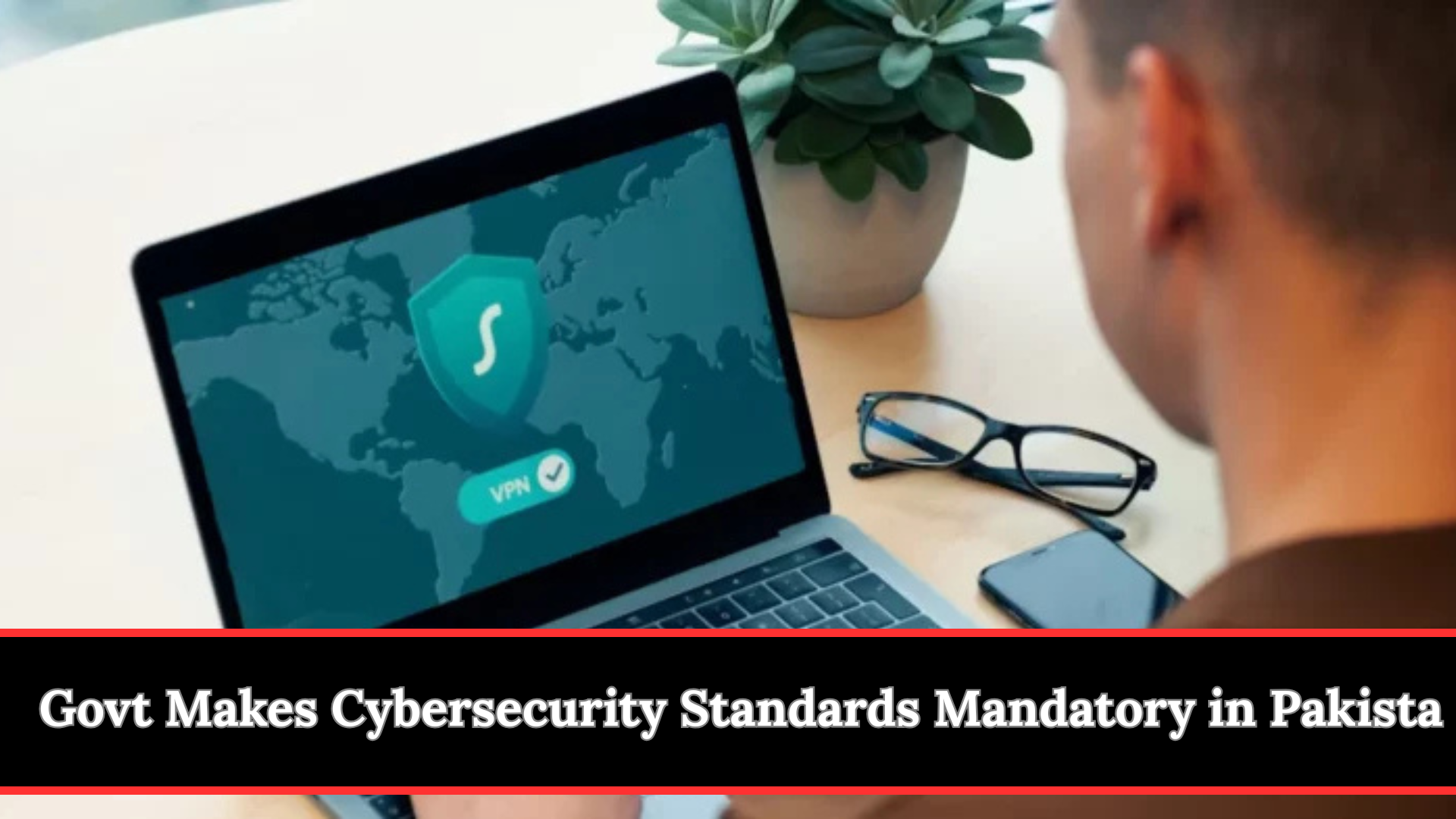Govt Makes Cybersecurity Standards Mandatory in Pakistan. The Government of Pakistan has taken a major step to strengthen the country’s cybersecurity ecosystem by making it mandatory for both public and private sectors to adopt official cybersecurity standards.
This move aims to protect critical digital infrastructure, enhance data privacy, and ensure that organizations follow globally recognized security benchmarks. The notification was issued by the National Computer Emergency Response Team (National CERT), urging all vendors, developers, and technology partners to start compliance immediately.
Why Cybersecurity Standards Are Now Mandatory
With rising incidents of cyberattacks, data breaches, and digital fraud, Pakistan’s digital systems face growing threats. To address these challenges, the government has enforced Public Sector Security (PSS) standards — a framework built to protect sensitive information and prevent unauthorized access.
The decision ensures that every organization dealing with government data, public systems, or private digital infrastructure maintains a minimum cybersecurity baseline.
Key Objectives:
- Protect digital infrastructure from hacking or malware attacks.
- Secure public and private communication channels.
- Strengthen data security across commerce and government systems.
- Ensure supply-chain security through vendor compliance.
What is the PSS Framework?
The Pakistan Security Standards (PSS) framework is a comprehensive set of rules designed to standardize cybersecurity practices across all organizations. It is aligned with international cybersecurity benchmarks, making it globally credible and technically robust.
| Standard | Global Equivalent | Purpose |
|---|---|---|
| PSS Framework (Pakistan) | — | National cybersecurity standard |
| FIPS 140 (U.S. Federal) | Cryptographic security validation | Data encryption and module security |
| ISO 15408 (Common Criteria) | Global evaluation of IT products | Testing and certification of secure systems |
These alignments mean that organizations following PSS will automatically meet international security standards, which is a major advantage for global trade and IT outsourcing.
Enforcement Deadlines and Key Dates
The Pakistan Standards and Quality Control Authority (PSQCA) issued a statutory notification in June 2023, making PSS adoption mandatory for all cryptographic and ICT security functions.
Implementation Timeline:
| Sector / Organization | Deadline for Compliance | Remarks |
|---|---|---|
| Defense-linked entities | December 2025 | Must adopt early due to high-risk data exposure |
| Public and Private sectors | June 1, 2028 | Full enforcement across all industries |
| Technology vendors & developers | Ongoing | Must start certification process now |
Organizations that fail to comply before their deadline may face restrictions on product deployment, procurement bans, and legal penalties.
How It Affects Public and Private Organizations
The directive applies to all institutions that deal with digital systems, data transmission, or encryption services — including banks, telecom companies, IT firms, and government departments.
Impact on Public Sector:
- Ministries, agencies, and state departments must ensure data protection and secure communication.
- All software and hardware used in government projects must be PSS-certified.
- Government procurement units are now directed to block non-compliant purchases.
Impact on Private Sector:
- Companies offering IT services, fintech solutions, or cloud systems must begin cybersecurity certification through accredited testing labs.
- Vendors providing systems to the public sector must comply with PSS certification to continue their contracts.
- Firms that fail to comply risk being blacklisted from government tenders.
Role of the National CERT and NTISB
The National Computer Emergency Response Team (National CERT) will monitor implementation and issue advisories to ensure compliance.
The National Telecom and Information Security Board (NTISB) will oversee compliance in defense-related sectors and critical infrastructure.
NTISB’s Key Directives:
- All defense-linked organizations must implement cybersecurity standards by December 2025.
- No defense software or system can operate without official certification.
- Organizations must map suppliers and subcontractors to ensure complete security coverage.
Vendors and Developers: What You Must Do
Vendors and developers have been advised to begin the certification process through accredited security testing laboratories.
Steps for Compliance:
- Review the PSS framework from PSQCA’s official website.
- Conduct a gap analysis of your existing systems.
- Start certification testing at an accredited lab.
- Obtain your PSS Compliance Certificate.
- Update your cybersecurity policies and staff training accordingly.
Tip: Early compliance will make your company more competitive and trustworthy in the government and defense sectors.
Why Standardization is Essential
Cybersecurity standardization helps build a strong national cyber-defense ecosystem. With all organizations following the same framework, the government can quickly detect vulnerabilities and respond to threats.
Benefits of Standardization:
- Improved national security against cyberattacks
- Uniform security policies across all sectors
- Reduced operational risks
- Enhanced confidence among international investors
- Faster digital transformation under safe protocols
Government Procurement and Supply Chain Security
The government has directed procurement departments to avoid purchasing non-compliant IT products. This ensures supply chain integrity, preventing fake or insecure systems from entering national infrastructure.
For instance:
- No software, system, or device can be manufactured, sold, or deployed without PSS certification.
- Vendors must prove compliance before their bids are approved.
- All contracts involving digital systems will include security certification clauses.
This step will significantly reduce risks of data theft, spyware, or malicious hardware components entering government systems.
Public Awareness and Industry Campaigns
The advisory also calls for awareness campaigns across industries. Critical sector organizations must inform suppliers, conduct training workshops, and plan early adoption to avoid operational disruption.
These campaigns will help small and medium-sized enterprises (SMEs) understand the importance of cybersecurity and prepare their teams for compliance.
Future Outlook
By 2028, Pakistan aims to become a digitally secure nation with all major organizations operating under a unified cybersecurity framework.
The new standards will help:
- Attract international business partners
- Build trust in e-governance systems
- Promote safe digital innovation
Cybersecurity is no longer optional — it’s a national priority. Organizations that act early will not only meet compliance but also gain a reputation advantage in a secure digital economy.
Conclusion
The government’s decision to make cybersecurity standards mandatory for both public and private sectors is a critical milestone for Pakistan’s digital future. With the PSS framework aligned to international standards like FIPS 140 and ISO 15408, the move ensures global credibility, data security, and resilience against cyber threats.
Organizations must now begin immediate compliance to stay secure, competitive, and aligned with national policy before the deadlines of 2025 (defense) and 2028 (full enforcement).


















